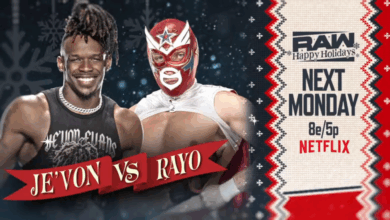Brandon Howard: How Wrestling Media Creates Stars
Up to this point in the post-Monday Night War era of U.S. professional wrestling, it’s been uncool to be anti-WWE.
Gone are the angsty sentiments Barry Blaustein documented for Beyond the Mat outside the ECW Arena in the mid-90s: voices that literally shouted, “Fuck WWF! Fuck WCW!”
When now-defunct upstate New York indie 2CW betrayed ire toward WWE in 2015, it was scolded by some fans.
An additional layer of cynicism has covered over the initial one that was once suspicious of power: an anti-authority angst that drove the nWo, Steve Austin and DeGeneration X to stardom in the late 90s.
In modern wrestling culture, as in wider culture, the new and defeatist cynicism of our time signals angst is a risk; we adopt vulnerabilities when we dare express sentiments of revolt, sentiments that can be ridiculed. The new cynicism reminds us not to believe too much in anything, to go along coolly with the ride, to accept that the ailments we inherit are insurmountable and attempts at progress are futile. We must be unsurprised, moderate and, if necessary, nihilistic.
While WWE still has its fans, even hardcore ones, who love what the company does, and even while business is healthy, there’s a near-consensus among pundits and hardcore fans that the industry leader’s creative direction in at least the last several years has been consistently poor.
To logon to whatever social media platform and vanquish the stupidity of others with a single post is the pastime of this generation. To use WWE as daily fodder for snark and ridicule is okay, even celebrated, but to move against the corporate giant outright and sincerely still violates some unspoken set of manners.
WWE’s allegedly toxic corporate culture, its routine doses of racism and sexism, its insistence on illegitimately classifying its performers as independent contractors, its anti-competitive practices (most recently seen in the U.K.), its opaque and inconsistent drug policy, its alliance with the most divisive U.S. president of at least our generation, etc., is apparently not enough to cause any action of real consequence from even a wave of underground fans.
Too much negativity toward WWE from one source can even be met with repulsion. “If you don’t like it, stop watching!” is the drowning mantra of the company’s loyalists, from fans and workers alike.
For the most part, waves of honesty never stir. Few inside the business risk burning the bridge: both those who've never crossed it and those who used to, from the youngest who hope to, to the oldest, who've earned the vast majority of their dollars from WWE's coffers and who want to preserve future paydays.
The myth of pro wrestling’s legitimacy as competition completed its gradual dissolution over the last few decades, only to be replaced by a new kayfabe to be protected at all costs: that Vince McMahon is still a competent booker.
WWE’s long-time major league status and efficient corporate machine allow the CEO to book for himself more than for his audience without much economic suffering. The days of a major angle sparking a territory, or a bad one killing it, are well behind us. The new industry irrevocably differs from its past by the audience’s wiser assumptions and more voluntarily suspension of disbelief and the product’s fewer mysteries. Future TV contracts notwithstanding, Vince McMahon’s business is unbreakable.
What’s been lacking to tip fandom over into a wider revolt has been the emergence of a victim (or victims) with built-in respect and an active following: heroes facing adversity, babyfaces in peril.
Poor creative may not chase away WWE’s frustrated customers, but it’s starting to chase away some frustrated workers.
In WWE’s defense, the company’s view of talent has evolved in the last few years, albeit due to Paul Levesque more than Vince McMahon: A.J. Styles and Shinsuke Nakamura have been acknowledged and valued as international stars with some meaningful recognition earned outside the big league.
Over the same period however Cody Rhodes, Alberto Del Rio, Ryback, Jack Swagger, Austin Aries, Sami Callihan, Juice Robinson and Wade Barrett each voluntarily left the company within the last two years. CM Punk, one of the biggest stars of the era, walked out at the dawn of the Network era. Creative discontent was a factor for all. The likes of Zack Sabre Jr., Kota Ibushi and Sonjay Dutt passed on WWE contracts so they could work elsewhere. With uncertainty around their futures, Neville and Nia Jax may be next to turn away.
WWE is not just creating heroes upon ejection from the company; it’s starting to grant status to those who’ve never even worked for them. The company’s real feud with the Young Bucks recently escalated due to WWE’s inability to merely ignore them. Jimmy Jacobs was fired from his position as writer and jettisoned back to the indies to be a wrestler with more name value than when he left that scene. The Bucks peripheral relation to Jacobs’ firing only makes them bigger stars.
To what extent Jacobs’ Instagram photo of himself posing with the Bullet Club played a factor in his firing — whether it was the main reason or the last straw — is less the point. The facts are for historians. More affecting will be the story murmured about, if inaccurately, as fans file in for each weekend’s array of events around the world.
It matters less that WWE was never actually courting Kenny Omega at the beginning of this year. It matters more that a lot of fans heard something about that and maybe they heard, true or not, that he turned them down.
We’re entering a time when wrestling media can be used as a vehicle to gain real influence over the fan base.
Vince managed to dominate his industry at a time when he controlled a far bigger share of the places in media where you could even see or hear someone talk about wrestling. When I grew up in the 90s, wrestling magazines were few and kayfabed. McMahon’s TV reigned. His competitors’ TV was often mismanaged and tempted by a similar conceit. Few even knew insider newsletters existed. Mainstream media’s allergy to “fake” wrestling kept independent scrutiny to a minimum (and even then he could barely handle it).
The audience today is more free. Ticket-buying customers didn’t need it explained to them by WWE media that JBL was a major player in the company’s culture of hazing; they knew it because they read it from the wrestling media and booed JBL accordingly.
The push of Jinder Mahal as champion is undermined, not just by how obvious it is that he’s surrounded by superior talent, but by fans’ awareness of the corporate strategy involved: that the company’s trying to build a star to appeal to India’s huge population, a point repeatedly noted throughout wrestling media.
Mixed crowd reactions to Roman Reigns, repeatedly unexpected and fought against by McMahon, are aided by the fact fans from all over the world are able to connect and realize they’re not the only ones who felt Reigns was being force-fed by a company too happy to disregard their sentiment.
The adage, “If it didn’t happen on our TV, it didn’t happen”, becomes less wise every day. Since the advents of the internet and the social media platforms that made us all publishers and the smartphones that put worldwide broadcast devices in our pockets, McMahon’s once near-exclusive control of wrestling fan mindshare is threatened and will only become weaker as electronic media further saturates our lives.
The recent firing of Jacobs to at least some extent over a post on social media is no coincidence. His termination is an early cry from an organization experiencing the first shakes to its loosening grip on communication with the public.
The most interesting and perhaps the most consequential events of future wrestling history will be played out not on WWE television but via the wrestling media, and those who most influence the wrestling media will have an advantage.
Vince thinks he can still manipulate the fans, but doesn’t realize it’s now wrestling media that manipulates them too, and the wrestling media is persona non grata to Vince. He sees himself as a victim of the wrestling media and tries to shut them out rather than participate in the conversation, only gouging his delusions further.
Meanwhile the Young Bucks and the rest of the Bullet Club are exploiting the gap. The Bucks aren’t just popular, hip, self-referential and ironic; they’ve have won over the most influential force in wrestling media: Dave Meltzer. Unlike many of their predecessors, they don’t just respectfully acknowledge him, they’ve gone to lengths to flatter him. They’ve named their most spectacular move, the Meltzer Driver, after him. They playfully call him ‘Uncle Dave’. They got him to do a cameo appearance in their “Being The Elite” video series.
“I think everyone else is acting as [the Young Bucks’] advocate, in the same way [CM] Punk had his disproportionate share of voice when he would do stuff. It gets enormous clicks,” Chris Harrington pointed out on a recent episode of our podcast. “There are certain personalities out there that the wrestling media embraces and the fans embrace the wrestling media that embrace them.”
A wrestling media driven largely by ad revenue, or “eyeballs” as WWE CFO George Barrios might say, is shaped by wrestling fans themselves. While that sub-industry’s influence may still be overshadowed by the far larger reach of WWE’s international TV broadcasts and nearly 1 billion social media touch points, more of the ground is in play.
Vince’s fawning over mainstream outlets like Rolling Stone and ESPN and his insulation against wrestling-specific media continues to widen a gap those outside the company will use to become bigger stars without Vince’s giant machine, creating machines of their own.
Follow Brandon on Twitter @BrandonThurston. Email him at [email protected]. He co-hosts Wrestlenomics Radio, a weekly podcast on wrestling business.




